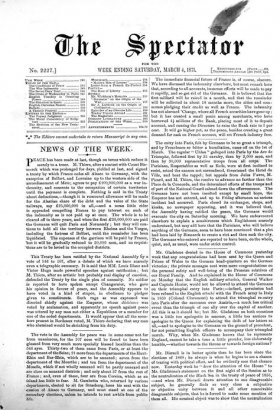Mr. Gladstone denied in the House of Commons yesterday week
that any congratulations had been sent by the Queen and Prince of Wales to the German head-quarters on the German victories ; the private messages sent were mere congratulations on the personal safety and well-being of the Prussian relatives of our Royal Family. And he explained in the House of Commons on Monday that the English military attaches, General Walker and Captain Hozier, would not be allowed to attend the Germans on their triumphal entry into Paris ;—indeed, permission had been refused to the English attaché with the French army in Italy in 1859 (Colonel Claremont) to attend the triumphal re-entry into Paris after the successes over Austria,—a much less critical event than the triumph of one ally over the capital of another. All this is as it should be ; but Mr. Gladstone on both occasions was a little too apologetic in manner, a little too anxious to apologize to the Queen for explaining the drift of her letters at all,—and to apologize to the Germans on the ground of precedent, for not permitting English officers to accompany their triumphal march. Why, when Mr. Gladstone knows that he represents England, cannot he take a tone a little prouder, less elaborately humble,—whether towards the throne or towards foreign nations?


































